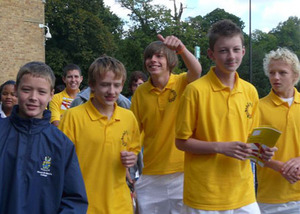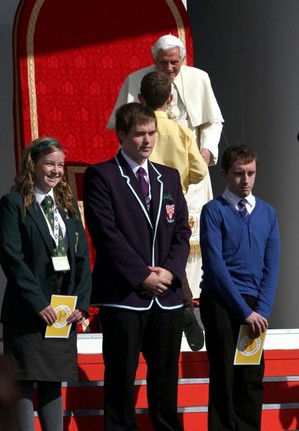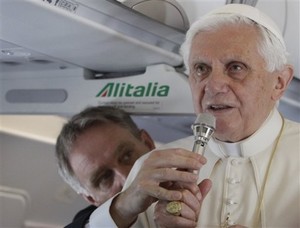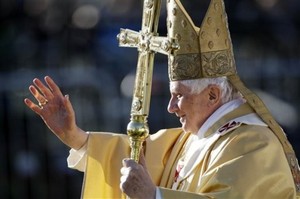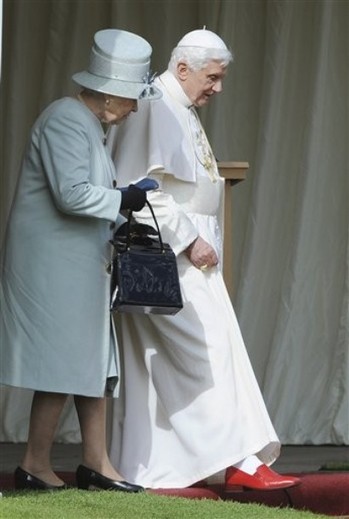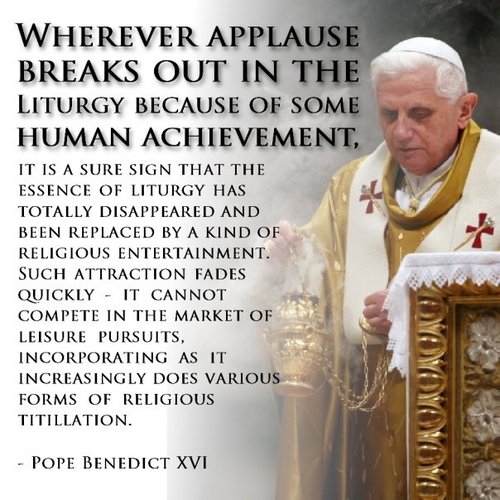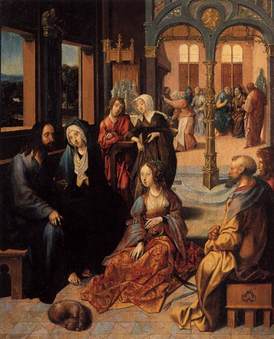I couldn’t follow the Pope’s UK trip after very early Friday morning so I find myself reviewing the magnificent papal event. If you’ve not read Benedict’s UK addresses, I highly recommend that you do so. What follows are some of the stunning thoughts of the Holy Father from an education gathering at St Mary’s University College. I have to say, when I was in the Catholic school system as a student and as a teacher, the idea of becoming a saint, or at least using the word ‘saint’ never crossed my mind. Sad to say. Sure we spoke about virtue, grace, sin, sacrament, love, God but we may have talked around the idea of becoming a saint which is not a good thing. BUT becoming a saint has a new currency in my life. The tenderness and clarity of the Pope’s address to the youth is nothing but beautiful. The are resonances in the talk of Sts Benedict, Francis, Dominic and Ignatius of Loyola, and Fr Giussani. Here are some excerpts, emphasis mine.
It is not often
that a Pope, or indeed anyone else has the opportunity to speak to the students
of all the Catholic schools of England, Wales and Scotland at the same time.
And since I have the chance now, there is something I very much want to say to
you. I hope that among those of you listening to me today there are some of the
future saints of the twenty-first century. What God wants most of all for each
one of you is that you should become holy. He loves you much more than you
could ever begin to imagine, and he wants the very best for you. And by far the
best thing for you is to grow in holiness.
Perhaps some of you have never
thought about this before. Perhaps some of you think being a saint is not for
you. Let me explain what I mean. When we are young, we can usually think of
people that we look up to, people we admire, people we want to be like. It
could be someone we meet in our daily lives that we hold in great esteem. Or it
could be someone famous. We live in a celebrity culture, and young people are
often encouraged to model themselves on figures from the world of sport or
entertainment. My question for you is this: what are the qualities you see in
others that you would most like to have yourselves? What kind of person would
you really like to be?
When I invite you to become saints, I am asking you not
to be content with second best. I am asking you not to pursue one limited goal
and ignore all the others. Having money makes it possible to be generous and to
do good in the world, but on its own, it is not enough to make us happy. Being
highly skilled in some activity or profession is good, but it will not satisfy
us unless we aim for something greater still. It might make us famous, but it
will not make us happy.
Happiness is something we all want but one of the great
tragedies in this world is that so many people never find it, because they look
for it in the wrong places. The key to it is very simple – true happiness is to
be found in God. We need to have the courage to place our deepest hopes in God
alone, not in money, in a career, in worldly success, or in our relationships
with others, but in God. Only he can satisfy the deepest needs of our hearts.
Not
only does God love us with a depth and an intensity that we can scarcely begin
to comprehend, but he invites us to respond to that love. You all know what it is like when you meet someone interesting and attractive,
and you want to be that person’s friend. You always hope they will find you
interesting and attractive, and want to be your friend. God wants your
friendship. And once you enter into friendship with God, everything in your
life begins to change. As you come to know him better, you find you want to
reflect something of his infinite goodness in your own life. You are attracted
to the practice of virtue. You begin to see greed and selfishness and all the
other sins for what they really are, destructive and dangerous tendencies that
cause deep suffering and do great damage, and you want to avoid falling into
that trap yourselves. You begin to feel compassion for people in difficulties
and you are eager to do something to help them. You want to come to the aid of
the poor and the hungry, you want to comfort the sorrowful, you want to be kind
and generous. And once these things begin to matter to you, you are well on the
way to becoming saints.
In your Catholic schools, there is always a bigger
picture over and above the individual subjects you study, the different skills
you learn. All the work you do is placed in the context of growing in
friendship with God, and all that flows from that friendship. So you learn not
just to be good students, but good citizens, good people. … Always remember
that every subject you study is part of a bigger picture. Never allow
yourselves to become narrow. The world needs good scientists, but a scientific
outlook becomes dangerously narrow if it ignores the religious or ethical
dimension of life, just as religion becomes narrow if it rejects the legitimate
contribution of science to our understanding of the world. We need good
historians and philosophers and economists, but if the account they give of
human life within their particular field is too narrowly focused, they can lead
us seriously astray.
A good school provides a rounded education for the whole
person. And a good Catholic school, over and above this, should help all its
students to become saints. I know that there are many non-Catholics studying in
the Catholic schools in Great Britain, and I wish to include all of you in my
words today. I pray that you too will feel encouraged to practise virtue and to
grow in knowledge and friendship with God alongside your Catholic classmates.
You are a reminder to them of the bigger picture that exists outside the
school, and indeed, it is only right that respect and friendship for members of
other religious traditions should be among the virtues learned in a Catholic
school. I hope too that you will want to share with everyone you meet the
values and insights you have learned through the Christian education you have
received.

